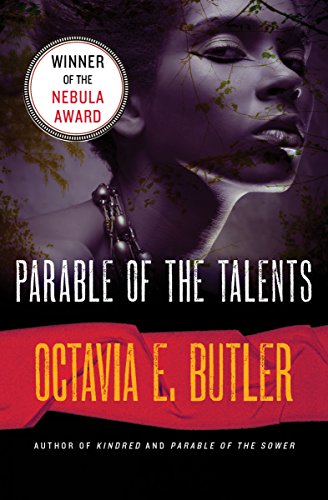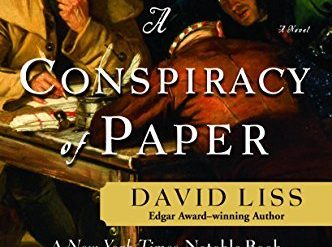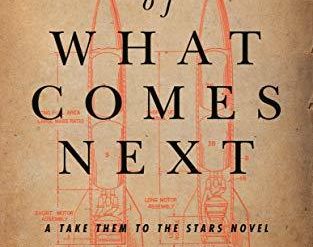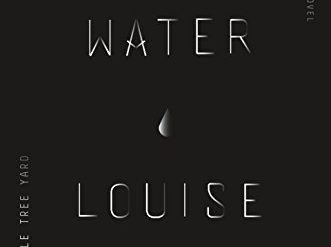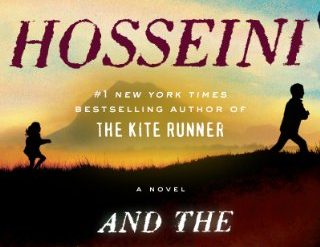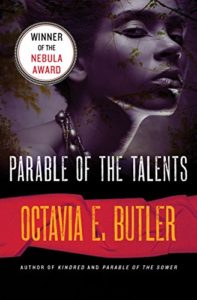
Read Octavia E. Butler‘s two-book Parable series or the five-volume Xenogenesis cycle, and you’ll understand why she won a MacArthur Foundation genius grant as well as multiple Hugo and Nebula awards. The Parable of the Talents, the second of the two Parable novels, may be the best of all her long fiction. Today, in 2017, it reads as though she might have written it yesterday. Yet if any book written in the last two decades or so could be referred to as classic science fiction, this is it.
Estimated reading time: 4 minutes
The Parable cycle tells the tale of Lauren Oya Olamina Bankole and the Earthseed belief system she created in the midst of a violent and chaotic American future. In the midst of our collapsing civilization—a period known as “the Apocalypse” or “the Pox”—a demagogue named Jarrett is elected President. His followers, reminiscent of the Ku Klux Klan, rampage throughout the country, imposing their racist and intolerant “Christian America” faith through wholesale murder and reeducation camps. In “Earthseed: The Books of the Living,” Lauren reflects:
Choose your leaders with wisdom and forethought. To be led by a coward is to be controlled by all that the coward fears. To be led by a fool is to be led by the opportunists who control the fool. To be led by a thief is to offer up your most precious treasures to be stolen. To be led by a liar is to ask to be told lies. To be led by a tyrant is to sell yourself and those you love into slavery.
The Parable of the Talents (Parable #2 of 2) by Octavia E. Butler (1993) 448 pages ★★★★★
Winner of the Nebula Award
Classic science fiction with a message for our times
This passage, written more than 20 years ago, could as easily have appeared in 1920s Italy, 1930s Germany, 2000s Russia—or 2017 America. So could this one, too:
Beware: All too often, We say What we hear others say. We think What we’re told that we think. We see What we’re permitted to see. Worse! We see what we’re told that we see.
In the first volume of the cycle, The Parable of the Sower, 15-year-old Lauren hides from the deteriorating society around her to write day by day the poetic passages that grow into Earthseed. Lauren narrates the events of the next several years through her journal. The Parable of the Talents takes up the story following Lauren’s death at an advanced age. The principal narrator is Lauren’s estranged daughter, Larkin. Her brief commentaries alternate with passages from what remains of Lauren’s journal and the recollections of her younger brother, also estranged.
What Earthseed is about
Lauren explains what Earthseed is about: “Change is the one unavoidable, irresistible, ongoing reality of the universe. To us, that makes it the most powerful reality, and just another word for God.”Along the way, her daughter Larkin extends the explanation: ‘”God is Change,’ she says and means it. Some of the faces of her god are biological evolution, chaos theory, relativity theory, the uncertainty principle, and, of course, the second law of thermodynamics. ‘God is Change, and, in the end, God prevails.’
Yet Earthseed is not a fatalistic belief system. God can be directed, focused, speeded, slowed, shaped. All things change, but all things need not change in all ways. God is inexorable, yet malleable. Odd. Hardly religious at all. Even the Earthseed Destiny”—that humankind will populate new worlds among the stars—”seems to have little to do with religion.” Doesn’t this read like a religion that a science fiction writer might create? And of course it is.
About the title
The title, The Parable of the Talents, refers to “the twenty-fifth chapter of Matthew, quoting the words of Christ: ‘For the kingdom of heaven is as a man traveling into a far country who called his own servants, and delivered unto them his goods. And unto One he gave five talents, to another two, and to another one. . .” As you may recall, the word talents does not refer to human abilities. Rather, according to the Merriam-Webster Dictionary, a talent is any of several ancient units of the weight of gold or silver. Perhaps I’m dense, but it’s difficult for me to see the relevance to this novel other than that it reflects Lauren’s youth as the daughter of a Baptist preacher.
For related reading
This book is a prime example of Octavia Butler’s prescient science fiction. It’s also one of the many Good books about racism.
For more good reading, check out:
- These novels won both Hugo and Nebula Awards
- The ultimate guide to the all-time best science fiction novels
- 10 top science fiction novels
- The top 10 dystopian novels
- Ten new science fiction authors worth reading now
You might also check out Top 10 great popular novels.
And you can always find my most popular reviews, and the most recent ones, on the Home Page.

